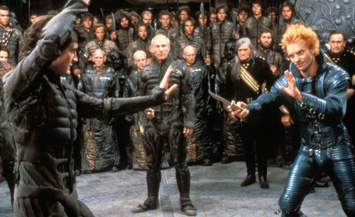|
|
Viking Night: DuneBy Bruce HallSeptember 14, 2016
Tens of thousands of years in the future, humanity has colonized most of the known universe. All of this is ruled by a single Emperor, and an assortment of ruling families that do his bidding. It’s more or less the way Medieval times worked, except…in space. The most important planet in the universe is called Arrakis, and it is the source of a mysterious Spice called “mélange.” Without this substance, interstellar travel is impossible, meaning of course that this technology is tightly controlled by a shadowy and powerful few. But in the right hands, the Spice can also bestow certain individuals with remarkable abilities. This gives rise to some of the beliefs and religious practices that make the Dune universe so enthralling. What’s less interesting are the political machinations that result in the Emperor (Jose Ferrer) turning against one of the most powerful ruling families, House Atreides. The Matriarch of the family, Leto Atreides (Jürgen Prochnow), is made governor of Arakkis as part of a ploy to make him vulnerable. Once the Atreides are in place, their arch rivals, Clan Harkonnen, have orders to move in and wipe them out. There’s just one problem. Well, two, actually. Remember the Spice, and the mystical powers it can bestow upon a chosen few? Well, Leto’s wife/girlfriend/concubine (women are essentially tools in this universe) Jessica (Francesca Annis) and her son Paul (Kyle MacLachlan) are two such people. And it happens that the indigenous inhabitants of the desert planet Arakkis have a Prophecy about a Chosen One who will someday free their planet from bondage and bring rain to the deserts.
|

|
|
|

|
Wednesday, April 24, 2024
© 2024 Box Office Prophets, a division of One Of Us, Inc.


